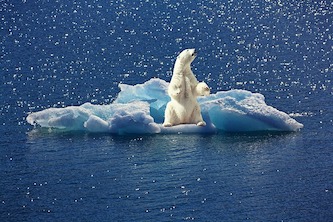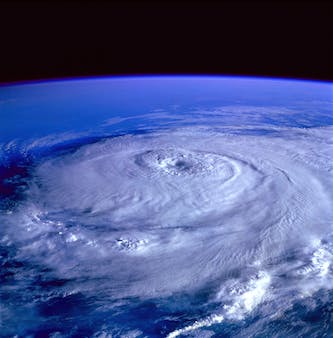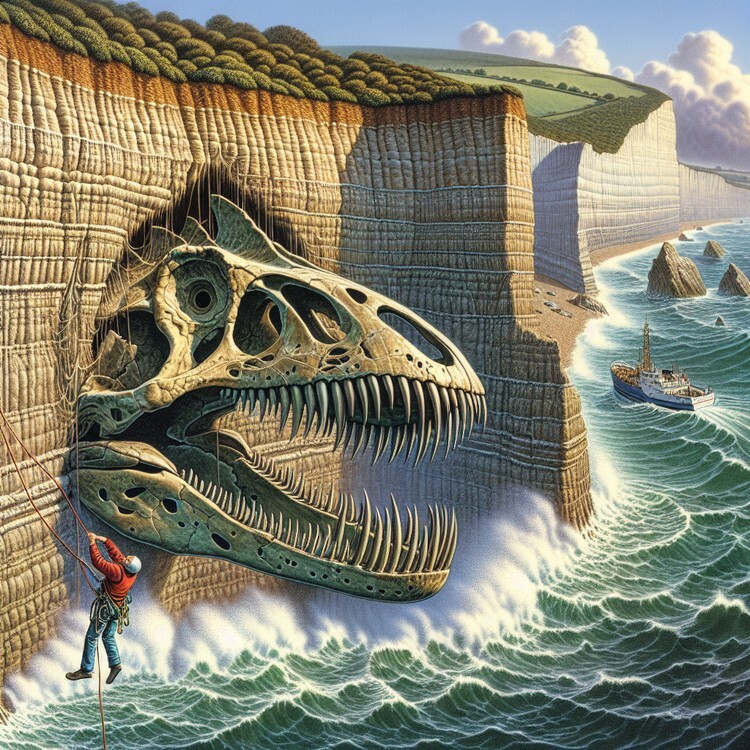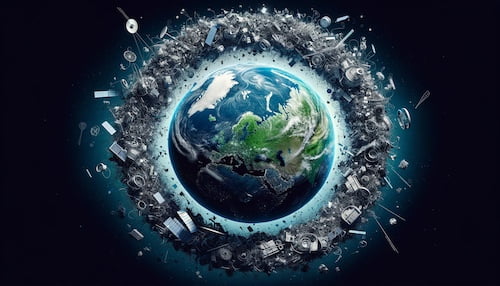Climate change is a big problem that is making the world get hotter faster than we thought. In 2023, the weather has been really extreme, with super high sea temperatures, less ice in Antarctica, and crazy weather events happening everywhere. It’s almost certain that 2023 will be the hottest year ever recorded, which scientists didn’t expect at the beginning of the year. The main reason for all this warming is because people are putting greenhouse gases, like carbon dioxide, into the air by burning fossil fuels.
There are a few things that might explain why the temperatures in 2023 are so much higher than we thought. One reason is a natural weather system called El Niño, which happened really quickly this time. El Niño puts more heat into the air, which makes the whole world warmer. Another reason is that there are less air pollutants called aerosols, which usually reflect some of the Sun’s energy back into space and cool the Earth. In 2020, rules were made to reduce a harmful air pollutant called sulphur dioxide, but it turns out that this actually made temperatures go up, especially in places where ships go a lot, like the North Atlantic.
A big volcanic eruption in January 2022 also made things hotter. The eruption let out water vapor into the air, which is a greenhouse gas that makes things warmer. Scientists are still studying how much this eruption affected the temperatures, but it seems like it didn’t have a huge impact. Also, the levels of ice in Antarctica are changing, which might be making things heat up even more. When there’s less ice, the ocean absorbs more of the Sun’s energy, which makes it warmer.
Even though the world is getting hotter faster, it’s still within the range of what scientists predicted. That’s kind of good news because it means we’re not in a really bad situation yet. But, the top climate scientists are warning that things might change even faster in the future. They say that the climate hasn’t fully reacted to the greenhouse gases we’ve already put into the air, and the cooling effect of aerosols might be hiding how much things are really warming up. The extreme weather we’re seeing now shows that we need to do something about climate change right away, like using less fossil fuels and finding other ways to make energy.
Original news source: Climate change: Is the world warming faster than expected? (BBC)
Listen
Slow
Normal
Fast
Group or Classroom Activities
Warm-up Activities:
– News Summary
Instructions: Divide the class into pairs. Each pair will read the article and then have five minutes to summarize the main points in their own words. After five minutes, pairs will switch partners and share their summaries. Encourage students to ask questions and clarify any points they may not have understood.
– Opinion Poll
Instructions: Divide the class into small groups. Each group will discuss their opinions on climate change and its impact based on the information in the article. They should then create a list of questions to ask their classmates about their opinions on climate change. After the questions are created, groups will take turns asking the questions and recording the responses. Encourage students to engage in a respectful and open-minded discussion.
– Vocabulary Pictionary
Instructions: Divide the class into teams. Each team will take turns selecting a vocabulary word from the article. One member of the team will then have one minute to draw a visual representation of the word on the board while their teammates try to guess the word. The team that guesses the word correctly earns a point. Continue playing until all the vocabulary words have been used or until time runs out. The team with the most points wins.
– Synonym Challenge
Instructions: Write a list of key vocabulary words from the article on the board. Divide the class into pairs. Each pair will have five minutes to come up with as many synonyms as possible for each word. After five minutes, pairs will share their lists with the class. Encourage students to explain the meaning of each synonym to ensure comprehension.
– Future Predictions
Instructions: In pairs, students will discuss and make predictions about the future of climate change based on the information in the article. They should consider the potential consequences and possible solutions. After the discussion, pairs will present their predictions to the class. Encourage students to support their predictions with evidence from the article.
Comprehension Questions:
1. What are some extreme weather events that have been happening in 2023?
2. Why is 2023 expected to be the hottest year ever recorded?
3. What are greenhouse gases and how are they being put into the air?
4. What is El Niño and how does it affect global temperatures?
5. How did reducing sulphur dioxide actually make temperatures go up?
6. How did a volcanic eruption in January 2022 contribute to the increase in temperatures?
7. How does the changing levels of ice in Antarctica affect global temperatures?
8. Why are climate scientists warning that things might change even faster in the future?
Go to answers ⇩
Listen and Fill in the Gaps:
Climate change is a big problem that is (1)______ the world get hotter faster than we thought. In 2023, the weather has been really extreme, with super high sea temperatures, less ice in Antarctica, and (2)______ weather (3)______ happening everywhere. It’s almost certain that 2023 will be the hottest year ever recorded, which scientists didn’t expect at the beginning of the year. The main reason for all this warming is because people are putting greenhouse gases, like carbon dioxide, into the air by burning fossil fuels.
There are a few (4)______ that might explain why the temperatures in 2023 are so much higher than we thought. One reason is a natural weather system (5)______ El Niño, which happened really quickly this time. El Niño puts more heat into the air, which makes the whole world warmer. Another reason is that there are less air pollutants called aerosols, which usually reflect some of the Sun’s energy back into (6)______ and cool the (7)______. In 2020, rules were made to reduce a harmful air pollutant called sulphur dioxide, but it turns out that this actually made temperatures go up, especially in (8)______ where ships go a lot, like the North Atlantic.
A big volcanic eruption in January 2022 also made things hotter. The eruption let out (9)______ vapor into the air, which is a greenhouse gas that makes things (10)______. Scientists are still studying how much this eruption affected the (11)______, but it seems like it didn’t have a huge (12)______. Also, the levels of ice in Antarctica are changing, which might be making things heat up even more. When there’s less ice, the ocean absorbs more of the Sun’s energy, which makes it warmer.
Even though the world is getting hotter faster, it’s still within the range of what scientists predicted. That’s kind of good news because it means we’re not in a really bad situation yet. But, the top (13)______ scientists are (14)______ that things might change even faster in the future. They say that the climate hasn’t fully reacted to the greenhouse gases we’ve already put into the air, and the cooling effect of aerosols might be hiding how much things are really warming up. The extreme weather we’re seeing now shows that we need to do something about climate change right away, like (15)______ less fossil fuels and finding other ways to make (16)______.
Go to answers ⇩
Discussion Questions:
Students can ask a partner these questions, or discuss them as a group.
1. What is climate change and why is it a big problem?
2. How do you think extreme weather events can affect people’s lives?
3. Do you think it’s important to reduce greenhouse gas emissions? Why or why not?
4. How would you feel if you lived in a place where the temperatures were getting hotter every year?
5. What do you think are some ways we can reduce our dependence on fossil fuels?
6. Do you think it’s fair for some countries to experience more extreme weather events due to climate change than others? Why or why not?
7. How do you think the reduction of air pollutants like aerosols can affect the Earth’s temperature?
8. What do you think are some consequences of melting ice in Antarctica?
9. How do you think the world would be different if there were no ice left in Antarctica?
10. Do you think the current efforts to combat climate change are enough? Why or why not?
11. How do you think the climate might change in the future if we continue to emit greenhouse gases at the same rate?
12. What are some alternative sources of energy that we could use instead of fossil fuels?
13. How do you think extreme weather events can impact the economy of a country?
14. Do you think individuals have a responsibility to take action against climate change? Why or why not?
15. How do you think climate change can affect different species of animals and plants?
Individual Activities
Vocabulary Meanings:
Match each word to its meaning.
Words:
1. climate change
2. problem
3. extreme
4. warming
5. greenhouse gases
6. temperatures
7. impact
8. energy
Meanings:
(a) The effect or influence that something has
(b) Very intense or severe
(c) Gases that trap heat in the Earth’s atmosphere
(d) The process of getting hotter
(e) The measurement of how hot or cold something is
(f) The change in weather patterns caused by human activity
(g) Something that needs to be solved or fixed
(h) The power or ability to do work or cause change
Go to answers ⇩
Multiple Choice Questions:
1. What is the main reason for the world getting hotter faster than expected?
(a) Natural weather systems like El Niño
(b) Decrease in air pollutants called aerosols
(c) Volcanic eruptions releasing water vapor into the air
(d) People burning fossil fuels and releasing greenhouse gases into the air
2. What is one effect of El Niño on the Earth’s temperature?
(a) It puts more heat into the air, making the world warmer
(b) It reflects some of the Sun’s energy back into space, cooling the Earth
(c) It increases the levels of ice in Antarctica, making things cooler
(d) It has no impact on the Earth’s temperature
3. How did the reduction of sulphur dioxide actually affect temperatures?
(a) It had no impact on temperatures
(b) It made temperatures go down, especially in places where ships go a lot
(c) It made temperatures go up, especially in places where ships go a lot
(d) It caused extreme weather events to occur
4. What effect did the volcanic eruption in January 2022 have on temperatures?
(a) It released water vapor into the air, which made things warmer
(b) It had no significant impact on temperatures
(c) It caused temperatures to decrease
(d) It caused extreme weather events to occur
5. How does the changing levels of ice in Antarctica affect temperatures?
(a) When there’s less ice, the ocean reflects more of the Sun’s energy, making it cooler
(b) It has no impact on temperatures
(c) It causes extreme weather events to occur
(d) When there’s less ice, the ocean absorbs more of the Sun’s energy, making it warmer
6. Are the current temperature changes within the range of what scientists predicted?
(a) No, it is much hotter than what scientists predicted
(b) No, it is much cooler than what scientists predicted
(c) Yes, it is still within the range of what scientists predicted
(d) It is impossible to determine
7. What are the top climate scientists warning about the future?
(a) The world will cool down significantly in the future
(b) Things might change even faster in the future
(c) The world will stay the same temperature in the future
(d) The world will get slightly warmer in the future
8. What do the climate scientists recommend to address climate change?
(a) Increasing the use of fossil fuels to stabilize temperatures
(b) Using less fossil fuels and finding other ways to make energy
(c) Ignoring climate change and focusing on other issues
(d) Building more coal power plants to reduce greenhouse gas emissions
Go to answers ⇩
True or False Questions:
1. El Niño, a natural weather system, has contributed to the higher temperatures in 2023.
2. The year 2023 has experienced extreme weather events and high sea temperatures.
3. Reductions in air pollutants called aerosols have also played a role in the increased temperatures.
4. The main reason for this cooling is the release of greenhouse gases, such as carbon dioxide, from burning fossil fuels.
5. Climate change is not causing the world to get hotter faster than expected.
6. Scientists predict that 2023 will not be the hottest year ever recorded.
7. A volcanic eruption in January 2022 did not release water vapor, a greenhouse gas, into the atmosphere.
8. The decrease in ice levels in Antarctica is further contributing to the warming trend.
Go to answers ⇩
Write a Summary:
Write a summary of this news article in two sentences.
Check your writing now with the best free AI for English writing!
Writing Questions:
Answer the following questions. Write as much as you can for each answer.
Check your answers with our free English writing assistant!
1. What are some extreme weather events that have been happening in 2023?
2. Why are temperatures in 2023 higher than scientists initially expected?
3. How does El Niño contribute to global warming?
4. What effect did reducing sulphur dioxide have on temperatures?
5. How does the level of ice in Antarctica affect global temperatures?
Answers
Comprehension Question Answers:
1. What are some extreme weather events that have been happening in 2023?
Some extreme weather events that have been happening in 2023 include super high sea temperatures, less ice in Antarctica, and crazy weather events happening everywhere.
2. Why is 2023 expected to be the hottest year ever recorded?
2023 is expected to be the hottest year ever recorded because of the increase in greenhouse gases, such as carbon dioxide, being put into the air by burning fossil fuels.
3. What are greenhouse gases and how are they being put into the air?
Greenhouse gases are gases that trap heat in the Earth’s atmosphere, causing the planet to warm up. They are being put into the air by human activities, particularly the burning of fossil fuels like coal, oil, and natural gas.
4. What is El Niño and how does it affect global temperatures?
El Niño is a natural weather system that occurs when there is a warming of the ocean surface in the central and eastern parts of the Pacific Ocean. It can cause global temperatures to rise because it puts more heat into the air, making the whole world warmer.
5. How did reducing sulphur dioxide actually make temperatures go up?
Reducing sulphur dioxide, a harmful air pollutant, actually made temperatures go up because sulphur dioxide has a cooling effect on the Earth. When the rules were made to reduce sulphur dioxide, there were fewer aerosols in the atmosphere to reflect the Sun’s energy back into space and cool the Earth, causing temperatures to increase.
6. How did a volcanic eruption in January 2022 contribute to the increase in temperatures?
The volcanic eruption in January 2022 contributed to the increase in temperatures by releasing water vapor into the air. Water vapor is a greenhouse gas that traps heat, causing things to warm up. However, scientists are still studying the exact impact of this eruption on temperatures.
7. How does the changing levels of ice in Antarctica affect global temperatures?
When there are less ice in Antarctica, the ocean absorbs more of the Sun’s energy instead of it being reflected back into space. This absorption of energy by the ocean causes it to warm up, which in turn affects global temperatures.
8. Why are climate scientists warning that things might change even faster in the future?
Climate scientists are warning that things might change even faster in the future because the Earth has not fully reacted to the greenhouse gases that have already been emitted into the atmosphere. Additionally, the cooling effect of aerosols might be hiding the true extent of global warming. The extreme weather events we are currently experiencing indicate that urgent action is needed to address climate change, such as reducing the use of fossil fuels and finding alternative energy sources.
Go back to questions ⇧
Listen and Fill in the Gaps Answers:
(1) making
(2) crazy
(3) events
(4) things
(5) called
(6) space
(7) Earth
(8) places
(9) water
(10) warmer
(11) temperatures
(12) impact
(13) climate
(14) warning
(15) using
(16) energy
Go back to questions ⇧
Vocabulary Meanings Answers:
1. climate change
Answer: (f) The change in weather patterns caused by human activity
2. problem
Answer: (g) Something that needs to be solved or fixed
3. extreme
Answer: (b) Very intense or severe
4. warming
Answer: (d) The process of getting hotter
5. greenhouse gases
Answer: (c) Gases that trap heat in the Earth’s atmosphere
6. temperatures
Answer: (e) The measurement of how hot or cold something is
7. impact
Answer: (a) The effect or influence that something has
8. energy
Answer: (h) The power or ability to do work or cause change
Go back to questions ⇧
Multiple Choice Answers:
1. What is the main reason for the world getting hotter faster than expected?
Answer: (d) People burning fossil fuels and releasing greenhouse gases into the air
2. What is one effect of El Niño on the Earth’s temperature?
Answer: (a) It puts more heat into the air, making the world warmer
3. How did the reduction of sulphur dioxide actually affect temperatures?
Answer: (c) It made temperatures go up, especially in places where ships go a lot
4. What effect did the volcanic eruption in January 2022 have on temperatures?
Answer: (a) It released water vapor into the air, which made things warmer
5. How does the changing levels of ice in Antarctica affect temperatures?
Answer: (d) When there’s less ice, the ocean absorbs more of the Sun’s energy, making it warmer
6. Are the current temperature changes within the range of what scientists predicted?
Answer: (c) Yes, it is still within the range of what scientists predicted
7. What are the top climate scientists warning about the future?
Answer: (b) Things might change even faster in the future
8. What do the climate scientists recommend to address climate change?
Answer: (b) Using less fossil fuels and finding other ways to make energy
Go back to questions ⇧
True or False Answers:
1. El Niño, a natural weather system, has contributed to the higher temperatures in 2023. (Answer: True)
2. The year 2023 has experienced extreme weather events and high sea temperatures. (Answer: True)
3. Reductions in air pollutants called aerosols have also played a role in the increased temperatures. (Answer: True)
4. The main reason for this cooling is the release of greenhouse gases, such as carbon dioxide, from burning fossil fuels. (Answer: False)
5. Climate change is not causing the world to get hotter faster than expected. (Answer: False)
6. Scientists predict that 2023 will not be the hottest year ever recorded. (Answer: False)
7. A volcanic eruption in January 2022 did not release water vapor, a greenhouse gas, into the atmosphere. (Answer: False)
8. The decrease in ice levels in Antarctica is further contributing to the warming trend. (Answer: True)
Go back to questions ⇧













